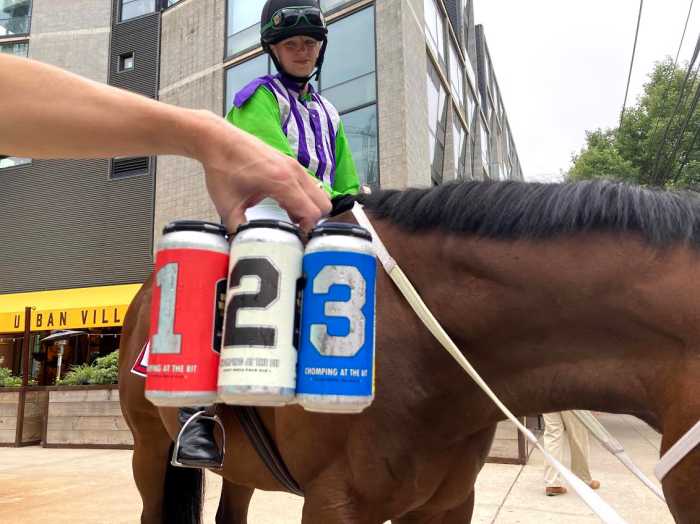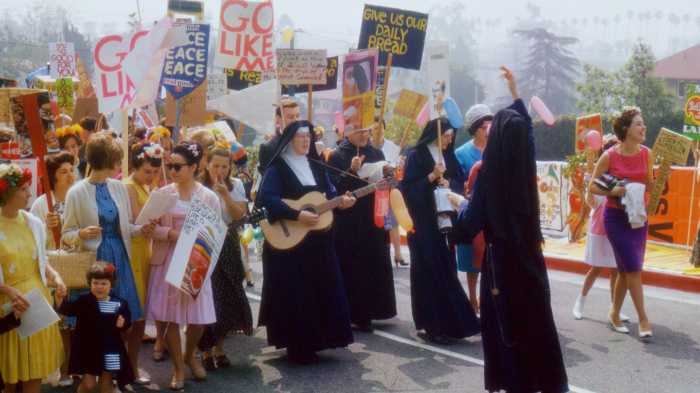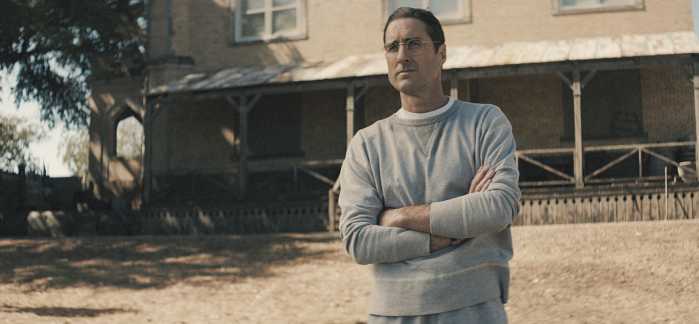When you really nail down just how tough it is to get a movie made in Hollywood, it all seems a bit daunting. Throw in some religion, and some might say you have the basis for a script to live in limbo. But when Mark Wahlberg heard about Stuart Long, he knew it was a movie he wanted to make and a character he wanted to play.
Some might say he had faith.
Wahlberg’s six-year journey to getting ‘Father Stu’ made came out of a lunch he had with two priests, and a story where certain elements stood out to him—sounds par for the course when talking inception of scripts in Tinsel Town, but this was different for the actor.
“This is an opportunity for me to do something for the greater good and to utilize my talents and all of the blessings that God has bestowed upon me… To make something special that’s a reflection of my faith and my beliefs. And to honor such an amazing person,” Wahlberg explains. “I just want to be able to do more with the talents that I’ve been given… I think this movie was a great opportunity for me to start focusing on more faith-based content, things of that nature. I’m talking about it a lot now because I’m talking about the movie, but I don’t want to be out there saying look at all the wonderful things I’m doing. I just want to do them without anybody knowing, and I certainly don’t need a pat on the back for it.”
Pat on the back or not, this is obviously a passion project for the veteran actor.
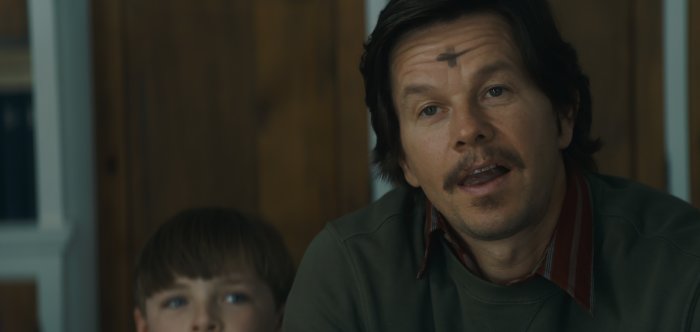
Stuart Long’s story, as we see it, begins with him as an amateur boxer in his home state, Montana. After the blows keep coming, and his health declines, he decides to leave his life and head to LA to become an actor. This pursuit proves to be like the last, but he’s a dog with a bone when it comes to what he wants. And eventually, he meets Carmen (Teresa Ruiz) and his eye turns from the spotlight to the Catholic Church—but he’s not quite on the road to becoming a priest yet.
It’s not until he’s drinking in a bar, and a conversation strikes up between Stu and an unusually prophetic patron (“Some people get it right away and some people don’t,” says Wahlberg of the scene) and then a horrible motorcycle accident occurs that Stu decides to change his ways. Although the details are different, Wahlberg recognized the character and his growth right away.
“I’ve had a difficult upbringing and it wasn’t until I found my faith that I was really able to turn my life around. People can change, people can grow, and people are capable of doing incredible things. They also need to be loved, supported, nurtured and encouraged to do those things,” Wahlberg explains. “I always find myself quoting some of the most remarkable figures in the history of the church—reformed men. I know a lot of people growing up that struggled and didn’t know any better, this is what they were faced with every time they walked out their door. And I don’t ever want them to think that I’m forgetting about them or that they shouldn’t have hope or they can’t turn their lives around. No matter how far they’ve gone the other way.”
Father Stu is an example in Wahlberg’s eyes. His life hasn’t exactly been a piece of pie. We learn he lost his brother when he was very young, and his parents never really got over it—and he doesn’t seem to have forgiven the world either. But his tenacity and want to succeed becomes amplified when he finds his faith. After finally landing Carmen and surviving that accident, he chooses instead to become a priest. And it’s then that his struggles truly begin.
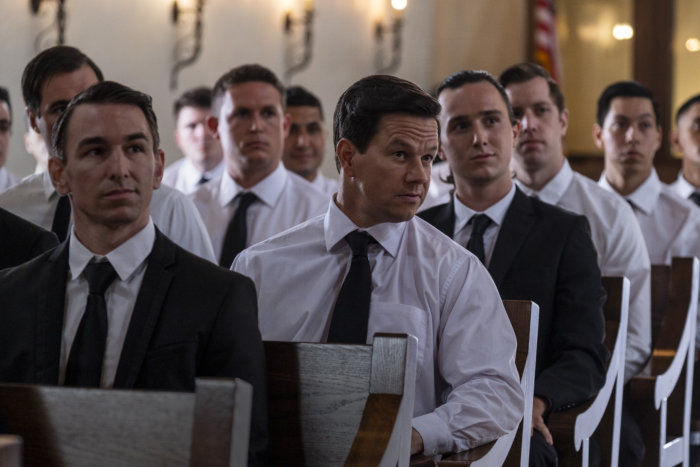
“All of his flaws, his sense of humor, his relentlessness and his approach to finding what his purpose was…How powerful he became, how much emphasis he put on his physicality, how much he relied on that and then how that was all taken away— his real strength came from his spirituality and the amount of people that he touched,” Wahlberg continues.
After being diagnosed with a rare degenerative muscle disease while in Seminary School, Stu once again is faced with obstacles and challenges. But as he later says in the film: “Don’t pray for an easy life, pray for a difficult one—the struggle brings you closer to God.”
It’s one of the many lines that comes from the story. In true Wahlberg fashion, ‘Father Stu’ showcases the best of his abilities. The funny one-liners, the bad-a** character who’s rough around the edges, and the strength of an all-star cast (Jacki Weaver and Malcolm McDowell are perfectly cast, and there’s a lot of emotion in Mel Gibson’s moments especially towards the end.) ‘Father Stu’ is the story of one man, but really, it’s the story of many—or more so, what his inspiration can do for those who need it most.
With the news plastered with shootings, war and hate almost every single day, it seems as though that ideology is timely. We see Stu’s impact throughout the third act of the film, so can it transfer? According to Wahlberg, that’s where the faith comes in.
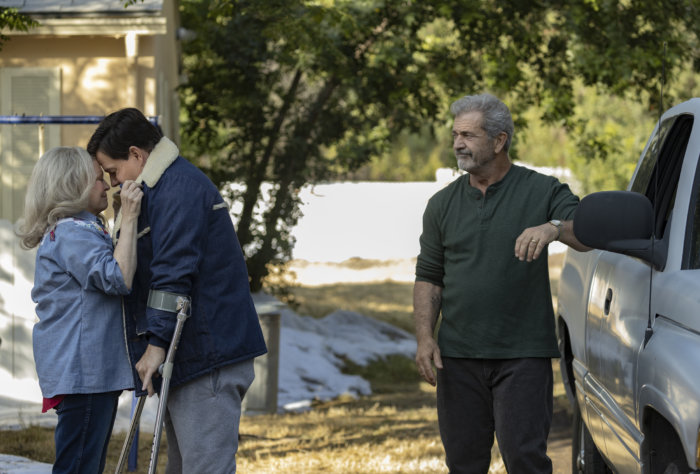
“Certain things just don’t make sense and they’re out of your control—control the things that you can and surrender to the things that you can’t and know that God has a big plan in place and he’ll utilize you in the way that he wants too,” Wahlberg finishes. “Everybody is going through hard times and difficult times. You don’t have [to be] religious to be able to relate to loss, difficulty and the times that we’re living in right now. And these things help you, they give you comfort and to really be hopeful about the future and more optimistic that things can get better.”
‘Father Stu‘ opens in theaters April 13.




